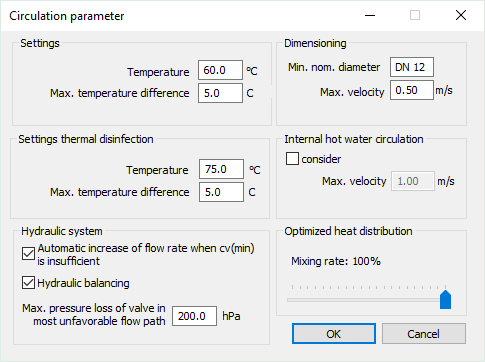Details on Circulation Settings
Information about the Circulation settings dialog in the calculation dialog of the circulation system.
You are here:

Settings
Enter the hot water temperature and the maximum temperature difference for regular operation of the circulation system.
Settings thermal disinfection
Enter the hot water temperature and the maximum temperature difference for the Thermal disinfection mode of the circulation system.
Hydraulic system
Automatic increase of flow rate when cv(min) is insufficient
Enabled: The program will check and increase the volume flow rate whenever the minimum cv-value is insufficient. The nominal diameter values will not be increased. The increase is performed within the scope of the maximum velocities in the circulation network. If the result is not as intended, you may decrease the difference in temperature.
Hydraulic balancing
Activated: Hydraulic balancing for the circulation system is carried out automatically during calculation.
Disabled: Without hydraulic balancing, all control valves and throttle valves will remain open during calculation to show the pressure difference in all flow paths and section parts.
Max. pressure loss of valve in most unfavorable flow path
If the pressure loss of the pipe run valve in the most unfavorable flow path exceeds the set limit value, a hint with respect to energy saving will be displayed in the report. By this means you may implement specific energy-saving measures by selecting another valve.
Dimensioning
Enter the minimum nominal diameter and maximum velocity for the circulating pipes.
Internal hot water circulation
Specify, whether internal circulating pipe is contained by this circulation system and enter the maximum velocity for these pipes.
Optimized heat distribution
When you calculate the pipe network according to DIN 1988-300 you can determine the mixing rate for the circulation pipe. This section is deactivated for other calculation methods.
This affects the distribution of the volume flow rates in the circulation pipes. This leads to modified valve settings at the pipe run control valves. The admixture can only be carried out for hydraulically balanced networks.
0%: The distribution of the volume flow rates is proportional to the branch heat-loss flow rates.
100%: Volume flow rates in the pipe runs will be reduced, which allows a cooling down to the minimum temperature in the collective pipe run. The admixture of water, warmer than the minimum temperature (55 °C), at the reunion node affects that the water in the collective pipe run remains at least 55 °C. The lower temperatures in the collective pipe run result in the reduction of the middle excess temperature of the system compared to the ambience.